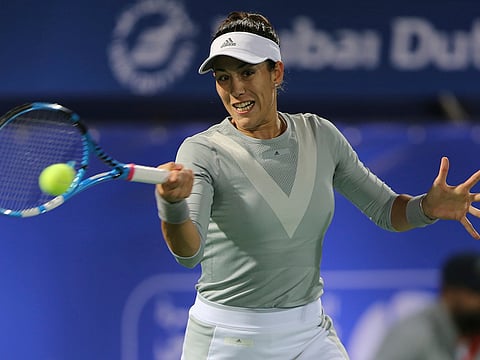A Grand Slam growth: Garbine Muguruza hails evolution as a player
Two-time Grand Slam champion advises young tennis players

Dubai: Garbine Muguruza, a former World No. 1 and two-time Grand Slam winner has spoken about her evolution as a more complete tennis player, thanks to the ongoing coronavirus pandemic.
Taking part in a mentoring session with some of the best junior players in the world in a session conducted by the International Tennis Federation (ITF) recently, Muguruza has been generous with her advise to the next generation of players.
“One of the things I improved is the way I train. In the past, I got bored during the training sessions, my attitude was bad. I liked competing but not training, but I changed my vision,” Muguruza told the juniors in a Zoom session.
“If I feel lazy, I think that Serena (Williams) is training on court … You must train as hard as the rest of the players, or harder. Now I like training a lot because it is the only way to have options during an actual match.”
Muguruza, who won the 2016 French Open and followed it up with a triumph at Wimbledon the following year, related how she had managed to inculcate a change in her attitude over the years.
“I like to feel healthy and fit. It is a mental test. I need to train to be fresh and fit for the next tournament. It will be six to eight months, but I will make sure that I’m ready. I won’t be sitting on the sofa,” she said.
“In the beginning, I was a ‘monster’ when I lost a match. Nobody could talk to me. Nowadays, if it has been a tricky match, I can be upset for one or two hours, but then I analyse the errors and let it go.
“Even if you lose an important match, you have another tournament two to three weeks later. That is the good thing about tennis. A match doesn’t decide your career.”
Known for her powerful groundstrokes and aggressive style, Muguruza came to prominence in 2014 after reaching the last 16 of the Australian Open while beating another former world No. 1 Caroline Wozniacki. In the second round of the French Open, she scalped another former top player Serena Williams to make it to the last-eight stage at Roland Garros.
“You always feel the pressure. I like it because it means that I care. However, if your nerves prevent you from playing, you must find a solution. I like to speak with my team, to analyse why I feel so much pressure, why I care so much about that match. I speak with my team to know what to do against my opponent, how to cope with the match. Personally, I speak a lot with my coach,” she said.
“Tennis visualisation helps me in difficult moments, to know what to do and why. If it is an important match, I try to visualise it, to train well, to have a positive mind. This helps me in every match.”
She made it to her first Grand Slam final at Wimbledon in 2015, where she lost to Serena Williams. But in the same year she won her maiden Premier-level crown by capturing the China Open in Beijing. She also qualified for her first WTA Finals before losing to eventual champion Agnieszka Radwanska in the semi-finals.
“The idea of winning another Grand Slam or any other trophy motivates me. I love competing. I must train hard to be among the best, to be able to be at the top again. I want to play finals. To play for the title is the best feeling,” she said to the juniors.
“I couldn’t sleep much before the finals I played. You need to deal with it. It would be terrible if nerves prevented you from playing. I tend to think too much. When I’m in the tennis club, I am concentrated on my work. When I leave the club, I watch a movie, go for a walk, speak with my team or I do a videocall. I disconnect from tennis in my free time.
“I love travelling to places. I love playing on big stages, courts full of people who pay to see you and you are part of the show.”




